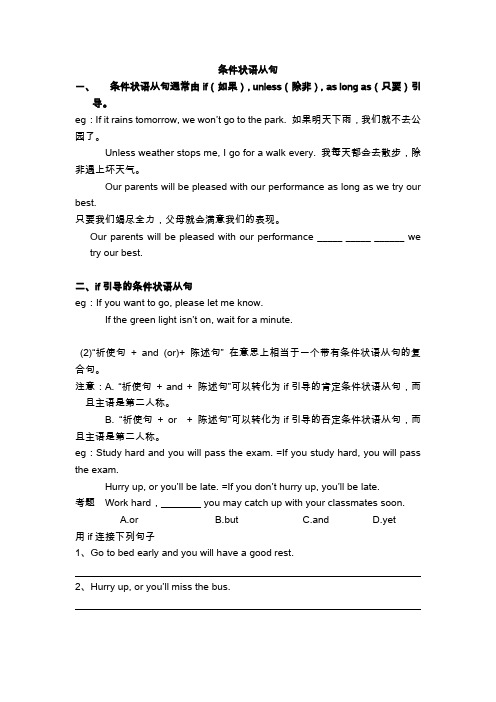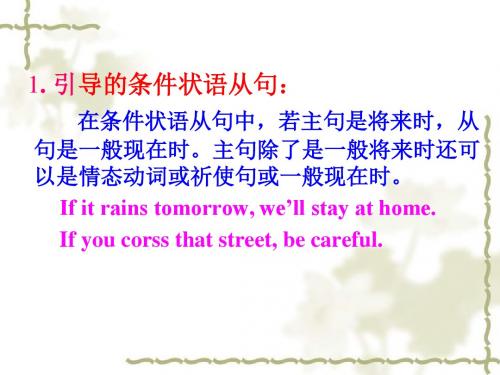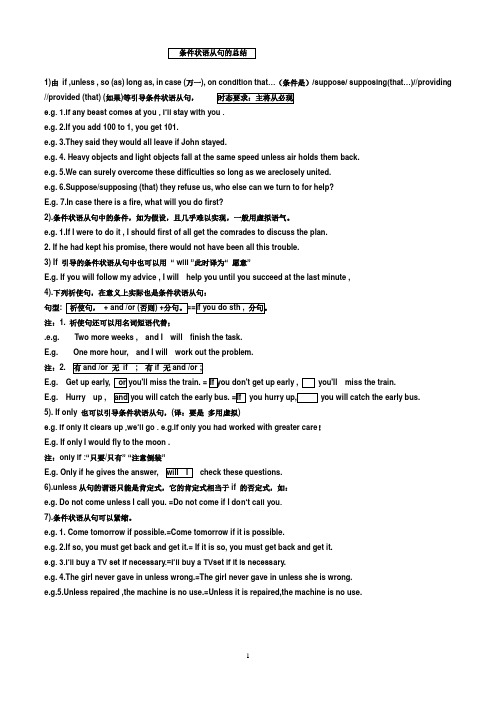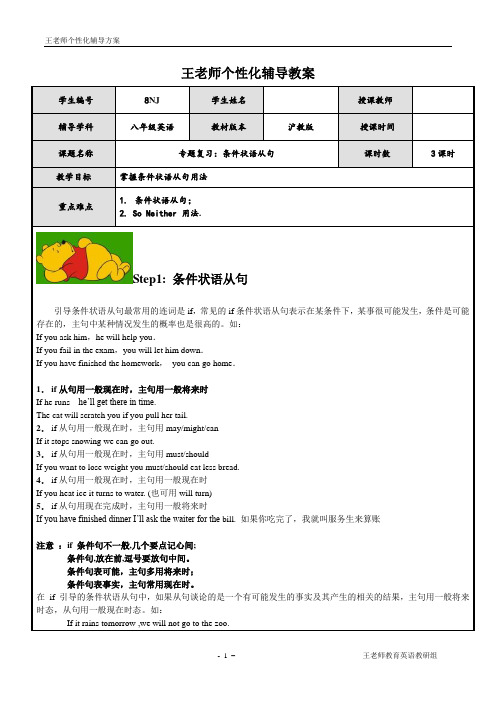条件状语从句整理
条件状语从句

条件状语从句一、条件状语从句通常由if(如果), unless(除非),as long as(只要)引导。
eg:If it rains tomorrow, we won’t go to the park. 如果明天下雨,我们就不去公园了。
Unless weather stops me, I go for a walk every. 我每天都会去散步,除非遇上坏天气。
Our parents will be pleased with our performance as long as we try our best.只要我们竭尽全力,父母就会满意我们的表现。
Our parents will be pleased with our performance _____ _____ ______ we try our best.二、if引导的条件状语从句eg:If you want to go, please let me know.If the green light isn’t on, wait for a minute.(2)“祈使句+ and (or)+ 陈述句” 在意思上相当于一个带有条件状语从句的复合句。
注意:A. “祈使句+ and + 陈述句”可以转化为if引导的肯定条件状语从句,而且主语是第二人称。
B. “祈使句+ or + 陈述句”可以转化为if引导的否定条件状语从句,而且主语是第二人称。
eg:Study hard and you will pass the exam. =If you study hard, you will pass the exam.Hurry up, or you’ll be late. =If you don’t hurry up, you’ll be late.考题Work hard,________ you may catch up with your classmates soon.A.orB.butC.andD.yet用if连接下列句子1、Go to bed early and you will have a good rest.2、Hurry up, or you’ll miss the bus.三、if从句与主句具有以下特点:1.If从句中用一般现在时,表示未来的一种条件,从句中可以加时间状语。
初中英语条件状语从句知识点总结

初中英语条件状语从句知识点总结条件状语从句是由if或unless引导的从句,用来表示一个条件或假设。
在条件状语从句中,主句的发生取决于从句中的条件是否满足。
条件状语从句有几个重要的知识点:1.条件状语从句的引导词条件状语从句的引导词包括if、unless、as long as、provided/providing (that)、in case、suppose (that)等。
其中,if 是最常用的引导词。
2.条件状语从句的基本结构条件状语从句的基本结构是:条件状语从句+主句。
主句是根据从句中的条件来表达的。
例如:- If it rains, we will stay at home.(如果下雨,我们会呆在家里。
)- Unless you study hard, you won't pass the exam.(如果你不努力学习,你就不能通过考试。
)- As long as you finish your homework, you can go out to play.(只要你完成作业,你就可以出去玩。
)3.条件状语从句中的时态条件状语从句中的时态使用从句中的谓语动词形式,根据具体的情况而定。
一般来说,当条件是现在或将来时,从句中的时态可以使用一般现在时、一般将来时或过去时;当条件是过去时,从句中的时态可以使用过去时、过去将来时或过去完成时。
例如:- If you study hard, you will pass the exam.(如果你努力学习,你将通过考试。
)- If I had known, I would have helped you.(如果我知道了,我会帮助你的。
)4.条件状语从句中的使用注意事项-在条件状语从句中,一般不使用将来完成时、过去完成时或过去将来时。
- 当主句的主语和从句的主语一致时,可以省略从句中的主语和be动词。
例如:- If it rains, he will stay at home.(如果下雨,他会呆在家里。
初中英语知识点归纳条件状语从句的引导词和用法

初中英语知识点归纳条件状语从句的引导词和用法条件状语从句是英语语法中的一种特殊句型,用来表示某个条件成立时会发生的情况。
在条件状语从句中,引导词起到引导从句的作用。
本文将对初中英语知识点中的条件状语从句的引导词和用法进行归纳。
一、if引导的条件状语从句1. 当主句是一般现在时时,条件状语从句可以是一般现在时或should + 动词原形。
例如:- If he comes early, we will go to the movies together.- If it rains tomorrow, we should stay at home.2. 当主句是一般过去时时,条件状语从句要用过去时态。
例如:- If I had money, I would buy a new car.- If he studied hard, he could pass the exam.3. 当主句是一般将来时时,条件状语从句可以使用一般现在时或一般过去时。
例如:- If you go shopping, I will wait for you here.- If I had time, I would help you with your homework.二、unless引导的条件状语从句1. Unless 在句中的含义与if相反,表示“除非”,引导的条件状语从句与if引导的条件状语从句的用法相同。
例如:- I won't go to the party unless you invite me.- Unless you practice more, you won't improve your English.三、as long as引导的条件状语从句1. As long as 表示“只要”,引导的条件状语从句要使用一般现在时。
例如:- You can join us as long as you finish your homework.- As long as you work hard, you will succeed.四、in case引导的条件状语从句1. In case 表示“以防”,引导的条件状语从句使用一般现在时。
条件状语从句英语语法大全

条件状语从句英语语法大全条件状语从句条件状语从句是由引导词if或unless引导的从句。
例如:1.如果明天不下雨,我们就去远足。
2.如果你努力研究,就会取得好成绩。
3.除非他也去,否则我不会去参加聚会。
4.如果你不马上走,你将会迟到。
(如果你不走,你会迟到。
)在英语中,条件是指某一件事情实现之后(状语从句中的动作),其它事情(主句中的动作)才能发生,通常译作“假如”。
需要注意的是,在含有条件状语从句的复合句中,表示将来时态时,主句要用一般将来时态,从句要用一般现在时、祈使句或情态动词,即主将从现原则。
主将从现并不是指将来时,而是表示将来的含义,与if后的从句相呼应。
条件状语从句类型if是条件状语从句最常用的连词,表示在某种条件下某事很可能发生。
例如:1.如果你请他帮忙,他会帮你的。
2.如果你考试不及格,你会让他失望。
if引导的条件状语从句既可以将从句放前面,也可以将从句放后面。
例如:“如果天下雨,我们就不玩了”可以转化为“We will。
playing if it rains.”此外,if从句还可以表示不可实现的条件或根本不存在的条件,即一种虚拟的条件或假设,从句多用一般过去时或过去完成时。
例如:表示可能实现的条件,主句用一般将来时,从句用一般现在时。
例如:If it rains tomorrow。
we will stay at home。
如果明天下雨,我们会待在家里。
非真实条件句则表示假设的情况,分为虚拟条件句和虚拟结果句。
虚拟条件句表示与现实相反的情况,主句用would/could/might+动词原形,从句用过去时或过去完成时。
例如:If I had more time。
I would travel around the world。
如果我有更多时间,我会周游世界。
虚拟结果句则表示与现实相反的结果,主句用过去时,从句用would/could/might+动词原形。
例如:If I had studied harder。
条件状语从句的归纳总结

条件状语从句的归纳总结条件状语从句是英语中重要且常用的一种从句类型,它用于表示某个动作或情况发生的前提条件。
在句子中,条件状语从句通常由指示条件的连词引导,如:if(如果)、unless(除非)、provided that(倘若)、as long as(只要)等。
本文将对条件状语从句进行归纳总结,并提供常见的应用实例。
一、以if引导的条件状语从句1. 表示真实条件“如果”某个条件成立,就会发生某个结果。
例句1: If it rains tomorrow, we will stay at home.(如果明天下雨,我们会待在家里。
)例句2: If you study hard, you will pass the exam.(如果你努力学习,你会通过考试。
)2. 表示与现在或将来相反的假设“如果”某个条件成立,但事实上并不成立。
例句1: If I were you, I would apologize to her.(如果我是你,我会向她道歉。
)例句2: If I had enough money, I would buy a new car.(如果我有足够的钱,我会买一辆新车。
)3. 表示过去某个假设的结果“如果”过去某个条件成立,就会有相应的结果。
例句: If he had studied harder, he would have passed the exam.(如果他当时学得更努力,他就会通过考试。
)二、以unless引导的条件状语从句unless的意思是“除非”,用于表示某个条件不成立时才会发生某个结果。
例句1: We won't go shopping unless it stops raining.(除非停止下雨,否则我们不会去购物。
)例句2: You won't lose weight unless you exercise regularly.(除非你定期锻炼,否则你无法减肥。
条件状语从句专项

条件状语从句条件状语从句表示主句中的某一动作或状态是在什么情况或条件下发生的。
条件状语从句中通常用一般现在时表示将来。
条件状语从句由从属连词引导:if, unless (除非), as / so long as (只要), on condition (只要), in case (假使) , providing / provided (that) 等。
由连接词if或unless引导的状语从句叫做条件状语从句。
注意:1). unless 从句里的谓语只能是肯定式,因为unless 本身表示否定;unless=if not,如:Let's go out for a walk unless you are too tired. =If you are not too tired, let's go out for a walk.如果你不是很累,我们出去散个步吧。
2). 在真实条件句中,主句不能用be going to表示将来,该用shall, will.如:If you will(愿意) wait a minute, I’ll go and tell my mother that you are here.如果你愿意等一分钟,我将去告诉我妈妈你在这里。
3). 下列从句中的will不是将来时助动词,而是情态动词。
翻译为“愿意”,如:If you will read the book, I will lend it to you.如果你愿意读书,我就会借给你。
Will you marry me? 你愿意嫁给我吗?e.g. a. We’ll come over to see you on Saturday if we havetime.b. We should serve the people as / so long as we live.1. We will be able to get there on time, _____our car doesn’t break down on the road.A.as soon asB. as far asC. as long asD. as well as2. In time of serious accidents, _____ we know some basic things about first aid, we can save lives.A.whetherB. untilC. ifD. unless3. ______ you have tried it, you can’t imagin e how pleasant it is.A. UnlessB. BecauseC. AlthoughD. When4. The official soon realized that, ______, things would get worse.A.unless dealt with properlyB.if not properly dealing with itC.unless properly dealt withD.if dealt not properly with5. ______ we have finished the course, we shall start doing more revision work.A.For nowB. Now thatC. By nowD. until6. ______, the idea off having to work under a woman defeated him.A.Wanting the job very muchB.Although wanting the job badlyC.Though he wanted the job very muchD.He wanted the job badly。
条件状语从句三种时态

条件状语从句三种时态
1.一般现在时:
现在,人们越来越关注科技发展对生活的影响,因为科技在很大程度上改变了我们的日常生活。
在过去,人们只能进行面对面交流;但是现在,他们可以通过网络进行视频通话,用智能手机购物,甚至用人工智能机器人做家务。
此外,科学技术还为我们提供了更多的便利,如在医疗和教育方面进行不断突破,以及更广泛、更实惠的交通运输工具。
因此,科技发展正在拓宽我们的世界视野,改善人们的生活质量,并大大提高了我们的工作效率。
2. 一般过去时:
过去,科技发展不太受到人们的重视,通信方式比较落后。
他们需要更多的时间和精力才能做出一些动作,而科技发展为他们带来的变化不多。
更重要的是,人们面对的问题比以前更多,他们不能有效的利用新的科技,比如电子信息技术,增加工作效率,甚至感觉到不如以前快捷。
因此,科技发展并没有给人们带来太多变化。
3. 一般将来时:
预计将来,随着科技发展不断推进,生活中会有更多惊人的变化,可以使人们更有效率地完成工作和学习。
为了实现这一目标,科学家和工程师们正在全力以赴研发不同的技术,可以提高生产力,改善生活质量,保护环境资源,甚至在机器视觉、机器人人工智能和虚拟现实
技术方面取得进步。
具体到未来,当这些科技发展达到一定水平时,它将为我们带来更多的便利,更加完善的生活环境,更快速优质的服务,让我们过上更有意义的生活。
条件状语从句知识点总结

条件状语从句知识点总结一、条件状语从句的基本结构条件状语从句由一个引导词(if 或者 whether)和一个句子构成。
引导词 if 或者 whether后面跟一个主句,主句表达了一个假设或者条件。
条件状语从句通常用来表示一种条件下可能发生的情况,如:If it rains, we will stay at home.(如果下雨,我们会呆在家里。
)这里的从句 If it rains 就是一个条件状语从句。
二、条件状语从句的语序条件状语从句的语序和主句基本一致,从句中要用陈述语序而非疑问语序。
比如:If he comes, I will be happy. (如果他来了,我会很高兴。
)三、条件状语从句中的时态条件状语从句根据具体的情况可以采用不同的时态,以下是一些常见的时态使用:1. 现在时:在主句表示将来时,从句要用一般现在时。
如:If it rains, I will stay at home.(如果下雨,我会呆在家里。
)2. 过去时:在主句表示过去时,从句要用过去时。
如:If I went to the party, I didn’t see him there. (如果我去参加派对了,我没在那看见他。
)3. 过去完成时:在主句表示过去的将来时,从句要用过去完成时。
如:If he had studied harder, he would have passed the exam.(如果他学的更努力些,他就能通过考试了。
)四、条件状语从句中的情态动词在条件状语从句中,情态动词有时会进行一些特殊的变化。
比如,当主句中使用了 will 或would 来表示将来时或者过去将来时,条件从句中的情态动词就要使用原形。
如:If you study hard, you will pass the exam.(如果你努力学习,你就能通过考试。
)五、条件状语从句的省略在条件状语从句中,如果从句的主语和主句中的主语是相同的,且从句中有一个情态动词,可以将从句中的主语和情态动词省略。
高中英语条件状语从句的句型

高中英语条件状语从句的句型【导语】在高中英语的学习中,学生会学习到很多的重要的句型,下面作者将为大家带来条件状语的句型的介绍,期望能够帮助到大家。
1条件状语从句句型1When / So long as / As long as / Once +从句,+主句。
(从句也能够放在主句之后。
)如:As long as you give me any money, I will let you go.只要你给我一些钱,我就让你走。
Once you have begun to learn English, you should learn it well. 一旦你开始学习英语,你应当把它学好。
句型2主句+on condition that+从句.如:I will go with you on condition that you give me a sum of money.我和你一起去的条件是你给我一些钱。
句型3主句+unless+从句.(注意:由于unless本身是否定词,所引导的从句的谓语动词用肯定而不用否定。
)如:I will go there tomorrow unless it rains.我明天去那儿除非下雨。
点击查看:高中英语语法大全句型4祈使句,+and/ and then+主句。
(注意:祈使句也可用一个名词短语。
)如:Use your head, and you will find a good idea.动脑筋想一想,你就会想出一个好主张。
Another word, and I will beat you.你再说一句,我就揍你。
句型5If +necessary / impossible/ important等,+主句.(注意:if与形容词之间的it is被省略。
)如:If necessary, I will do it. 如果有必要的话,我来做此事。
2原因状语从句句型1主句+in case+从句.(in case表示以免)如:I will take my raincoat in case it rains.我要把雨衣带上以免下雨。
英语中考专项条件状语从句

英语中考专项条件状语从句第一:条件状语是在句子中用来表达某种条件或前提的短语或从句。
它们通常用来描述一个事件或情况发生的条件。
条件状语可以使用各种不同的词或短语,以下是一些常见的条件状语及其定义:1. If(如果):表示假设条件,并指明某事可能发生的条件。
例句:If it rains, we will stay at home.(如果下雨,我们将待在家里。
)2. Unless(除非):表示除非某个特定条件成立,否则某事将发生。
例句:I won't go out unless it stops raining.(除非停止下雨,否则我不会出去。
)3. As long as(只要):表示只要某个条件得到满足,就会发生某事。
例句:You can stay here as long as you keep quiet.(只要保持安静,你可以在这里待着。
)注意:紧跟着引导词的是从句,另一部分是主句。
1)引导词if:(如果当然,我可以给您提供三个使用引导词"unless"的例子,并对每个例子进行详细说明:2)希望以上解释对您有所帮助!如果您还有其他问题,请随时提问。
)好的,以下是三个使用引导词"if"的例子,并对每个例子进行详细说明:1. If I work hard, I will succeed.这个句子中的主句是一般将来时态(will succeed),从句是一般现在时态(I work hard)。
条件状语"If I work hard"表示假设或前提,指出只有当我努力工作时,才会取得成功。
主句表达了一个结果,即未来的成功。
因此,这个句子传达了如果我努力工作,我将会成功的意思。
2. If it rains, we can't go for a picnic.这个句子中的主句是含有情态动词的一般现在时态(can't go),从句是一般现在时态(it rains)。
条件状语从句知识点总结

条件状语从句知识点总结一、条件状语从句条件状语从句是在主句和从句之间条件关系的从句,一般用来表示一定条件下事物发生的可能性,常用虚拟语气,表示与现实相反的假设。
1、以if, unless, supposing, providing, as long as, only if等引导的条件状语从句,它的谓语动词多用虚拟语气:(1)主句用一般现在时,从句谓语动词用“should/were to+动词原形”的结构;(2)主句用一般过去时,从句谓语动词用“should/would+动词原形”的结构;(3)主句用“should/would+动词原形”,从句谓语动词用“should/would+动词原形”的结构,例如:If you should pass the exam, I would be very happy.Unless she were to go there today, she would miss the bus.2、以unless引导的条件句表“前提”,意思是“如果不……”,它后面的谓语动词多用虚拟语气,其句子结构有二种形式:(1)unless+主句谓语动词+从句谓语动词;(2)Unless+主句谓语动词+从句谓语动词+be例如:Unless you work hard,you will fail the exams.Unless she is careful,she will be in trouble.3、以if…not引导的条件句,表示一定条件下发生的相反情况,它的谓语动词也用虚拟语气,句子结构由两种形式:(1)if+主句谓语动词+not,从句谓语动词+be;(2)If+主句谓语动词+not,从句谓语动词+动词原形例如:If he doesn't study hard, he won't pass the exam.If you didn't come here on time, you'd miss the train.4、以had better, would rather引导的条件句,它们表示一种建议,它的主句谓语动词必须用“should/would+动词原形”,从句谓语动词也有两种形式:(1)从句谓语动词+be;(2)从句谓语动词+动词原形。
条件状语从句

5.given that考虑到
• Given that they‘re inexperienced, they’ve done a good job.
• 考虑到他们缺乏经验,他们的工作已经 算是做得相当不错了
6.In case 万一
• Take a hat with you in case the sun is very hot. 万一太阳很厉害,你就把帽子 戴上。
3. provided that如果
• 如果天不下雨,我就去。 • I shall go provided that it doesn’t rain. 4. On condition that 条件是 我借给你这本书的条件是你必须立刻归还。 I shall lend you the book on condition that you return at once.
• 即使水很凉老人也喜欢游泳。 • The old man enjoy swimming even though the water is cold. • (4)whatever=no matter what无论什么 无论发生什么,他都不会介意。 • No matter what happened, he would not mind.=Whatever happened, he would not mind.
条件状语从句
一、引导词
• 条件状语从句的引导词有if, unless, as long as, in case, provided that, on condition that, given that, suppose/supposing that等。
• 1.unless除非,如果不 • 如果不多加练习,你永远都弹不好。 • You never play well unless you practice more. • 2. as long as 只要 • 只要你开车小心,你就会很安全。 • As long as you drive carefully, you will be safe.
条件状语从句英语语法总结

条件状语从句英语语法总结条件状语从句是英语中常见的一种从句形式,用于表达条件或假设情况下的结果。
以下是关于条件状语从句的总结:1. 结构:条件状语从句由一个条件状语从句引导词(if, unless, provided that, as long as等)+ 一个主句构成。
2. 类型:条件状语从句可以分为三种类型。
- 真实条件句(Real conditional sentences):表示在实际情况下的可能性。
- 如果主句使用一般现在时,从句使用一般现在时。
- 如果主句使用一般过去时,从句使用一般过去时。
- 例:- If it rains, I will stay at home.(如果下雨,我会呆在家里。
)- If I had time, I would go to the party.(如果我有时间,我会去参加派对。
)- 虚拟条件句(Unreal conditional sentences):表示不可能或假设情况下的结果。
- 如果主句使用过去完成时,从句使用过去完成时。
- 如果主句使用 would + 动词原形,从句使用过去完成时。
- 例:- If I had known, I would have helped.(如果我知道了,我会帮忙的。
)- If I were you, I would study harder.(如果我是你,我会更加努力研究。
)- 反对现实条件句(Contrary-to-fact conditional sentences):表示与现实相反的假设情况下的结果。
- 如果主句使用 would + 动词原形,从句使用过去式。
- 例:- If I were rich, I would travel the world.(如果我富有,我会周游世界的。
)- If I knew the answer, I would tell you.(如果我知道答案,我会告诉你的。
)3. 注意事项:- 虚拟条件句中使用“were”代替“was”,与单数和复数主语无关。
条件状语从句

条件状语从句条件状语从句如为真实性的,用陈述语气。
如为纯粹假设,不能成为事实,则用虚拟语气。
一、事实性条件从句1. 引导条件状语从句的连接词及词组(1) 常见的连接词有:if, unless, once, suppose/supposing(假如,设想), provided/providing(只要,如果)等。
If I have enough money next year, I’ll go abroad for further study.如果我明年有足够的钱,我将去国外进修。
I won’t go to the party unless I’m invited. 除非应邀,否则我不会去参加这次晚会。
Once you understand this rule, you will have no further difficulty. 一旦你掌握了这个规则,你就不会再有困难。
(2) 常见的连接词组有:on condition that(只要), in case(万一), as/so long as(只要)等。
如:I’l l lend you the money on condition that you pay it back in one month. 要是你能在一个月内把这笔钱还给我,我就可以把钱借给你。
You’d better close your window in case it rains. 你最好关上窗子以防下雨。
You may use the book as you like, as long as you keep it clean. 你只管用这本书,只要不把它弄脏就行。
2. 条件状语从句的时态在条件状语从句中,要用一般现在时表示一般将来时,用一般过去时表示过去将来时。
I’ll go climbing if it doesn’t snow tomorrow. 如果不下雪,我明天就去爬山。
条件状语从句英语语法大全

条件状语从句由引导词if或unless引导的状语从句叫做条件状语从句。
例如:1.If it doesn’t rain tomorrow, we will go hiking.如果明天不下雨, 我们就去远足.2.You will get good grades if you study hard.如果你努力学习,就会取得好成绩.3.I will go to the party unless he goes there too.我不会去参加聚会的, 除非他也去.(如果他不去,我也不去.)4.You will be late unless you leave immediately.如果你不马上走,你将会迟到的.(=If you don’t leave immediately, you will be late.)在英文中,条件是指某一件事情实现之后(状语从句中的动作),其它事情(主句中的动作)才能发生,通常译作“假如”。
注意:在含有条件状语从句的复合句中,表示将来时态,主句是一般将来时态,从句要用一般现在时,祈使句或情态动词[主将从现原则](主将从现,将并非指将来时,还只表示将来含义的,跟着if后的那句话是从句。
条件状语从句类型语法引导条件状语从句最常用的连词是if,由if引导的条件状语从句表示在某种条件下某事很可能发生。
如:1)If you ask him, he will help you.如果你请他帮忙,他会帮你的。
2)If you fail in the exam, you will let him down.如果你考试不及格,你会让他失望的if引导的条件状语从句既可以将从句放前面也可以将从句放后面(如果天下雨,我们就不玩了)If it rains, we will stop playing.‘转为We will stop playing if it rains.另外,if从句还表示不可实现的条件或根本不可能存在的条件,也就是一种虚拟的条件或假设,从句多用一般过去时或过去完成时。
条件状语从句

在条件状语从句中,若主句是将来时,从 句是一般现在时。主句除了是一般将来时还可 以是情态动词或祈使句或一般现在时。 If it rains tomorrow, we’ll stay at home. If you corss that street, be careful.
A. study B. studies C. will study D. studied
4. They will give us a talk if theyB __ free tomorrow. A. will be B. are C. were D. are going to 5. What __ B he do if he __ B the answer? A. will; won’t know B. will; doesn’t know
in bed ; at home…
课堂检测
请根据括号内的要求,改写下列句子,
每空一词(含缩写)。 1. How much is the English dictionary? (改为同义句)______ What's ______ the ______ price of the English dictionary? 2. He paid 100 yuan for the trousers. (改为同义句)
冠词的分类
种类 形式 意义 例词 a desk an hour a horse an egg a hand the map the man the earth 只能用在可数名词前,表 示 “一”的意思.a用在 不定冠词 a /an 以辅音音素开头的单词 前;而an用在以元音音素 开头的单词前.
定冠词
5. Be careful, or a car may hit you.
条件状语从句笔记整理

条件状语从句笔记整理以下是一份关于条件状语从句的笔记整理:1. 条件状语从句的定义条件状语从句是用来表示某个条件下的情况或结果的从句。
它通常与主句之间由if、unless、in case等连词连接。
2. 条件状语从句的分类条件状语从句可以分为真实条件状语从句和非真实条件状语从句。
真实条件状语从句表示在实际情况下的条件,而非真实条件状语从句表示虚拟的情况或与实际情况相反的情况。
3. 条件状语从句的构成条件状语从句由引导词(如if、unless等)和从句构成。
从句可以是简单句、复合句或并列复合句。
从句中的谓语动词可以使用一般现在时、一般过去时、将来时等时态,也可以使用虚拟语气。
4. 条件状语从句的用法条件状语从句在句子中表示某个特定条件下的情况或结果。
例如,if you study hard, you will pass the exam.(如果你努力学习,你会通过考试。
)除非引导词前面有否定词,否则引导词通常翻译为“如果”。
如果引导词前面有否定词,则翻译为“除非”。
5. 条件状语从句的时态和语态在真实条件状语从句中,主句和从句的时态应该一致,除非从句中的动作尚未发生。
在非真实条件状语从句中,主句和从句的时态可以不同,表示与实际情况相反的情况。
此外,在条件状语从句中,主语和谓语的语态可以是主动或被动。
6. 条件状语从句的虚拟语气在非真实条件状语从句中,可以使用虚拟语气来表达与实际情况相反的情况。
虚拟语气有三种时态:过去、现在和将来。
在if引导的条件状语从句中,如果与过去事实相反,可以使用“had+过去分词”的形式;如果与现在事实相反,可以使用“would+动词原形”的形式;如果与将来事实相反,可以使用“would+动词原形”的形式。
7. 省略条件状语从句在某些情况下,条件状语从句可以省略,只保留引导词。
例如,“If necessary, I will help you.”可以简化为“If necessary, I’ll help you.”(如果有必要,我会帮助你。
条件状语从句

条件状语从句一、条件状语从句的引导词if 如果 while(=as long as)只要as/so long as 只要 in case(假使),unless (=if…not)如果不…,除非supposing (that)/provided /providing (that)(假如),on condition that(在……的条件下)1. 用if引导:if意为“如果”(1)You can’t take photographs if the light isbad. 如果光线不好,你就不能拍照。
(2)If you cheat in the exam you’ll never getaway with it. 考试作弊必予追究。
(3) You can leave now if you like.如果你愿意现在就可以走了。
2. 用unless(=if…not)引导:unless的意思是“如果不”,“除非”(1)Don’t act unless you’re certain.除非你确定,否则不要采取行动。
/Don't take action unless you are sure.(2)Unless you go at once you will be late.如果你不马上走,就会迟到的。
/除非你马上走,否则你会迟到的。
(3)I will go there tomorrow unless it rains.(=…if it doesn’t rain)除非下雨,否则我明天要去那儿。
注1. 当所述条件会结束已经存在的想法,状态或趋向时,两者都可以。
(1)We shall go unless it rains tomorrow. =We shall go if it doesn't raintomorrow.如果明天不下雨,我们就去。
( “下雨” 会结束“去” 这一已经存在的趋向)(2)You will be late unless you take taxi. =You’ll be late if you don’t taketaxi.如果不打的你就要迟到。
条件状语从句的总结

1)由if ,unless , so (as) long as, in case (万一), on condition that…(条件是)/suppose/ supposing(that…)//providing//provided (that) (如果)等引导条件状语从句,e.g. 1.If any beast comes at you , I’ll stay with you .e.g. 2.If you add 100 to 1, you get 101.e.g. 3.They said they would all leave if John stayed.e.g. 4. Heavy objects and light objects fall at the same speed unless air holds them back.e.g. 5.We can surely overcome these difficulties so long as we areclosely united.e.g. 6.Suppose/supposing (that) they refuse us, who else can we turn to for help?E.g. 7.In case there is a fire, what will you do first?2).条件状语从句中的条件,如为假设,且几乎难以实现,一般用虚拟语气。
e.g. 1.If I were to do it , I should first of all get the comrades to discuss the plan.2. If he had kept his promise, there would not have been all this trouble.3) If 引导的条件状语从句中也可以用“ will ”此时译为“ 愿意”E.g. If you will follow my advice , I will help you until you succeed at the last minute ,4).下列祈使句,在意义上实际也是条件状语从句:句型注:1. 祈使句还可以用名词短语代替;.e.g. Two more weeks , and I will finish the task.E.g. One more hour, and I will work out the problem.注:2.E.g. you'll miss the train.E.g. Hurry up , you will catch the early bus.5). If only 也可以引导条件状语从句,(译:要是多用虚拟)e.g. If only it clears up ,we’ll go . e.g.If only you had worked with greater care!E.g. If only I would fly to the moon .注:only if :“只要/只有” “注意倒装”E.g. Only if he gives the answer, check these questions.6).unless从句的谓语只能是肯定式,它的肯定式相当于if 的否定式,如:e.g. Do not come unless I call you. =Do not come if I do n’t call you.7).条件状语从句可以紧缩。
条件状语从句

王老师个性化辅导教案Step1:Ⅰ.单项选择Ⅰ.单项选择( ) 1. ________ generous _____ the little girl to share her toys with the other kids.A. It’s; ofB. That’s; ofC. It’s; forD. That’s; for( ) 2. We think it is difficult _____ them ____ the charity walk without team spirit.A. for; to finishB. of; to finishC. for; finishingD. of; finishing( ) 3. It’s very kind ______ you. Thank you for your help.A. ofB. forC. toD. on( ) 4. ----Thank you for your good service.----You are welcome. It is patient ______ us to serve everyone.A. ofB. forC. toD. with( ) 5. It’s nice ______ Andy _____ me with my English study.A. at; to helpB. of; to helpC. with; helpD. of; help( )6. Today it is easy_______ on-line and millions of people use the Internet everyday.A. getB. to getC. getsD. got( )7. It is clever_______ you to answersuch a question.A. forB. onC. withD. of( )8. ______ fun it is to ride on acamel in the desert!A. WhatB. What aC. HowD. How a( )9. It takes 3 days for the parcel_______ America by air mail fromShanghai .A. reachB. reachedC. to reachD. reaches( ) 10. ______ important thing it is to do eye exercises everyday!A. WhatB. What aC. What anD. How( ) 11. It is no use _______ about the school lunch.A. complainB. complainingC. to complainD. complained( )12. Could you tell us where ____?A. will the next Olympic Games heldB. the next Olympic Games will be heldC. would the next Olympic Games be heldD. the next Olympic Games would be held( )13. When my mother returned last night, I ____ a book.A. readB. am readingC. was readingD. am going to read( )14.What ____ you ____ when it began to rain?A. do, doB. were, doingC. are, doingD. did, do( )15. I’ll wake you up when he ____back.A.willB. is going to comeC. comesD. ComeII.用it作形式主语改写句子1. To speak English more is very important for you.______________________________________________________2. To do more exercises is very helpful.______________________________________________________3.To do is more important than to say.______________________________________________________4.To help others is our duty.______________________________________________________5. To go to the South Pole is the boy's wish.______________________________________________________6. To drink plenty of water is good.______________________________________________________II. 根据短文内容及首字母提示,填写所缺单词。
